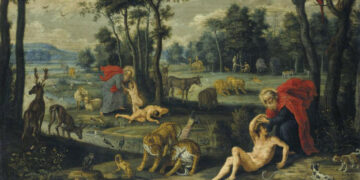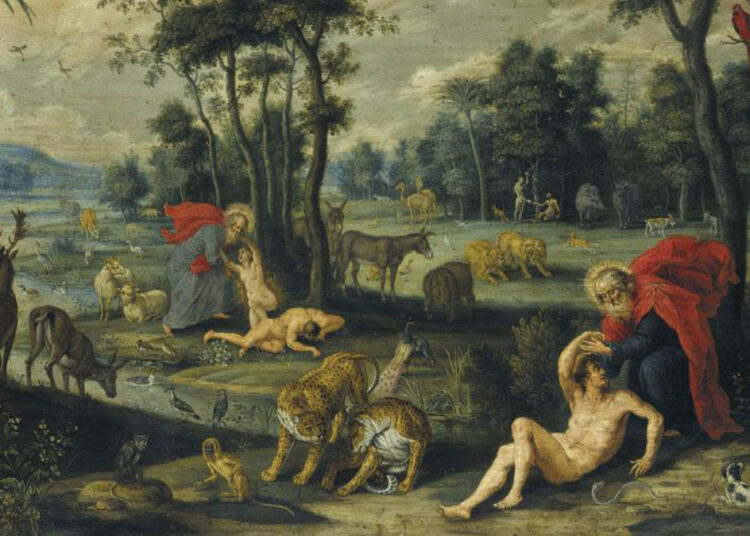Each year at the Easter vigil, according a custom that goes back to the very earliest days of Christianity, a series of prophecies from the Old Testament is read before the blessing of the waters and the baptism of the catechumens who have been preparing throughout Lent to receive the sacrament. Traditionally, the first of these prophecies is the beginning of the book of Genesis [note], which narrates the creation of the world; this is attested in the very first surviving homily preached on Easter, the Paschal homily of St. Melito of Sardis, ca. 160 AD.
The first and most obvious reason for this is to speak of the beginning of the old creation on the night when the Church celebrates its transformation into a new creation in the Resurrection of Christ, as expressed by the prayer that comes after the reading. “O God, who wondrously created man, and more wondrously redeemed him; grant us, we ask, to persist in reason of mind against the pleasures of sin, that we may merit to come to eternal joys.” The teaching of the Church, as expressed by its law of prayer, is that man is capable of using his reason, renewed by God’s grace, to resist the delights of sin; he is not compelled to yield to his own sinful and selfish impulses, much less to be defined by them.
The reading speaks at its beginning of the “Spirit of God (that) moved over the waters”, and this was understood as a reference to the waters of baptism. The traditional prayer by which they are blessed in the font looks back to this reading when it says, “O God, whose Spirit moved over the waters at the very beginnings of the world, so that the nature of the waters might even then receive the power of sanctification.”
But this passage is also chosen as a response to one of the most serious problems which confronted the early Church, a problem which has reappeared in different forms at various times throughout its history, namely, the heresy called Gnosticism.
There were many schools of Gnostic ideas, which expressed their thought in many different ways, but broadly speaking, they all taught that the material creation is actually the work not of God, much less of a benevolent and loving God, but of an evil power of some kind, which made it to imprison “spirit” in matter. (The Gnostics often called themselves “spiritual” people, and non-gnostics “material” people.) The word “gnosis” from which “gnostic” derives means “knowledge”, and for them, true knowledge meant the realization that the material world is a trap and a deception, meaningless to the “spiritual”, who could find in their religion the means to be delivered from it.
As a result of this, many of the Gnostic sects treated procreation itself as something inherently evil, because it perpetuated the entrapment of spirit in matter. This idea often led them to one of two extremes about human sexuality: either to reject it entirely, because it continued the entrapment of spirit in matter; or to declare that because matter is irrelevant, it does not matter what one does in, to, or with the material of the body, and one is therefore free to indulge in any kind of sexual license.
To this, the Church opposes the teaching of Genesis, which states that at the end of each day of creation, “God saw that it was good.” Furthermore, when God creates the animals, He blesses them, saying “increase and multiply”, which is to say, increasing and multiplying is a blessing, and not, as the Gnostics would say, a curse. This same blessing is then imparted to man, the very first words, in fact, which God speaks to him (verse 28); it is a blessing, and not a curse, for man to increase and multiply by means of his sexuality. This is a thing which he shares with the beasts, but does not use as the beasts do; rather, he also has the capacity of to govern himself with reason “against the delights of sin.”
Lastly, we should note that man’s place in creation as the head and ruler of it is also a blessing; he is not a parasite on the world, nor a stranger to it. At the end of the first five days of creation, God sees that it is good, but at the end of the sixth, when he has commanded man to “fill the earth, and subdue it, and rule over … all living creatures that move upon (it)”, He see that it is “very good.”
[In the Roman and Ambrosian Missals, Genesis 1, 1 – 2, 2; in the ancient Spanish liturgy known as the Mozarabic Rite, the reading ends at 2, 6, and is followed by another that continues to the end of chapter 3. In the Byzantine liturgy, the reading ends at verse 1, 13, the end of the third day of creation.]




















Discussion about this post